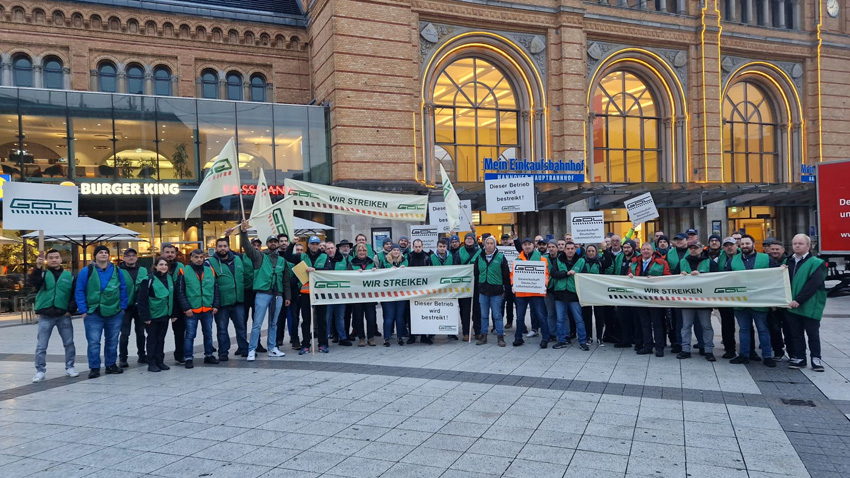Massive nationwide industrial action paralysed air and rail travel across Germany yesterday and Thursday as striking workers walked off the job to demand better pay and conditions to help them cope with the rising cost of living.
Thursday’s walkouts by the train drivers coincided with a strike by ground staff at national airline Lufthansa that led to mass flight cancellations at Germany’s busiest airports, including main hub Frankfurt.
Head of the GDL train drivers , Claus Weselsky said: ‘With this, we begin a strike wave.’
Overall, about 80 percent of all long-distance trains, as well as regional and commuter trains in the country, were cancelled, leading to traffic jams in the streets and employees struggling to arrive on time for work.
Gross domestic product (GDP) is expected to contract by 0.1 per cent in the first quarter after the economy shrank by 0.3 per cent in the final three months of 2023. A technical recession is commonly defined as back-to-back quarters of contracting GDP.
The German train drivers’ union (GDL) demands that national train operator, Deutsche Bahn, reduce workers’ weekly hours from 38 to 35 hours at full pay to help offset lofty inflation and staff shortages.
The action comes after weeks-long talks between the two parties broke down last week.
An earlier strike in late January, one of the longest in the state-owned company’s 30-year history, ended prematurely as an economic slowdown led to pressure on GDL to return to the negotiating table.
Meanwhile, Lufthansa is also locked in disputes with workers’ union Ver.di over pay.
The union is demanding a 12.5 per cent increase in pay over a year for the airline’s staff, as well as a one-off 3,000 euros (around £2,564) bonus.
Frankfurt airport, Germany’s busiest, was forced to cancel scheduled departures due to the strike, which will last until Saturday morning.
Germany plans to expand its presence in the Arctic, German Defence Minister Boris Pistorius said.
He described NATO’s Nordic Response drills involving Finland and Sweden as the alliance’s most important exercise in the past 40 years.
Germany, in his words, is strengthening cooperation with Norway and its new NATO partners – Finland and Sweden.
On a visit to Norway, Pistorius, who is hosting the Nordic Response 2024 drills, added: ‘We simply want to have a bigger presence here, in the Extreme North.
‘These are the largest and most important NATO drills in at least 40 years,’ he said.
On Wednesday, the German defence minister visited a Norwegian military base near the border with Russia and said that it was right to expand Bundeswehr presence in the Arctic, although the world is now focused on Ukraine and the Middle East.
Over 1,500 German troops are taking part in the Nordic Response 2024 drills that kicked off on March 7.
Finland’s air forces said earlier that more than 100 warplanes from Finland, Sweden, Norway and other NATO member countries would take part.
Meanwhile, Russian Deputy Foreign Minister Alexander Grushko said that Russia will closely follow the drills.
- Thousands of angry farmers demonstrated in Warsaw against European Union regulations and cheap Ukraine imports, with police reporting that two officers had been injured and a dozen protesters arrested.
Some demonstrators on Wednesday tried to force their way past security railings onto parliament grounds, according to police. Farmers also organised tractor blockades on roads across the country.
Polish farmers have been blocking border crossings with Ukraine since last month to protest against what they say is unfair competition from goods entering from Ukraine.
Ukraine has seen its agriculture sector crippled since Russia’s special operation in Ukraine in 2022.
Many of its major export routes through the Black Sea have been blocked and its farmland rendered unusable by warfare.
In a bid to help Ukraine economically, the EU in 2022 scrapped tariffs on Ukrainian goods transiting the 27-nation bloc by road.
But logistical problems mean a lot of the Ukrainian cereal exports destined for non-EU countries have accumulated in Poland, undercutting local producers.
Farmers in several other European countries have also been protesting for weeks over these conditions.
- 20,000 soldiers from nine US-led NATO countries took part in war games in Poland on Wednesday.
The exercise, Dragon-24 (DR-24), was at the Vistula River crossing near the village of Korzeniewo in northern Poland.
Vehicles crossing the river on the bridge, arriving at a field near the water, and performing various operations using M3 rig amphibious vehicles, tanks, boats, and other vehicles.
Soldiers from different countries could be seen participating in the exercise, driving vehicles, guiding them, and supporting the overall work.
As well as Poland, France, Germany, Lithuania, Slovenia, Spain, Turkey, the United Kingdom, and the USA took part.
- The ECB kept its benchmark interest rates on hold in March, noting a further decline in inflation.
The ECB emphasised that inflation has declined further, while reiterating its commitment to restoring price pressures to the medium-term target of 2 per cent.
The latest staff projections indicate that inflation is expected to average 2.3 per cent in 2024, followed by 2.0 per cent in 2025 and 1.9 per cent in 2026.
Additionally, projections for inflation, excluding energy and food, have been adjusted downward, averaging 2.6 per cent for 2024, 2.1 per cent for 2025, and 2.0 per cent for 2026.
Eurostat, which monitors the ECB, has indicated that the inflation rate for the euro area dipped to 2.6 per cent year-on-year in February 2024, lower than the previous month’s 2.8 per cent, but still slightly above market expectations of 2.5 per cent.
The ECB also said in a separate statement that it is extremely worried by high in elation in Turkey which borders EU countries.
Inflation in Turkey surged to a 15-month high in February.
Less than two weeks ago, Turkey’s central bank decided to keep its key interest rate steady at 45 per cent after an eight-month tightening cycle, a decision that is now being called into question.
